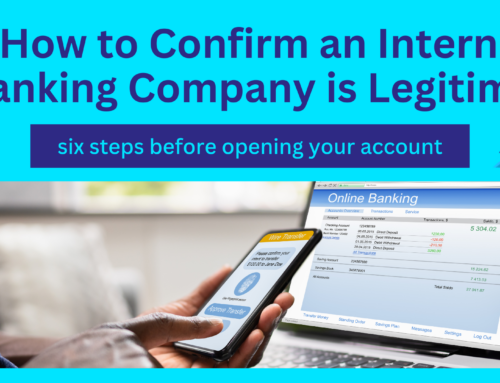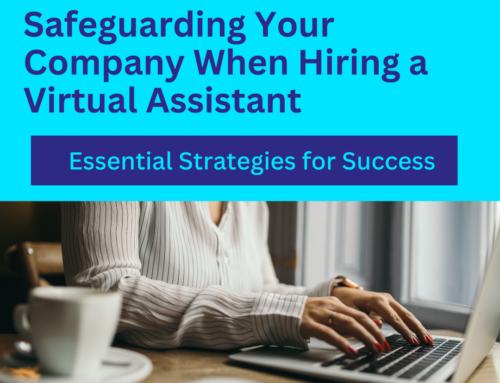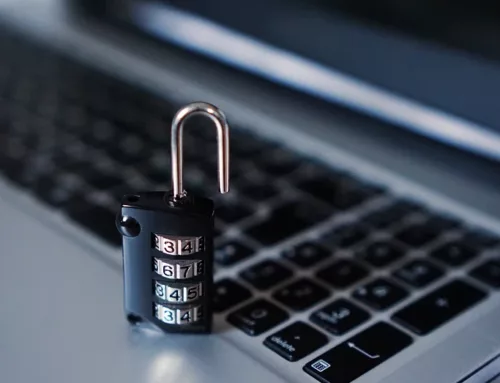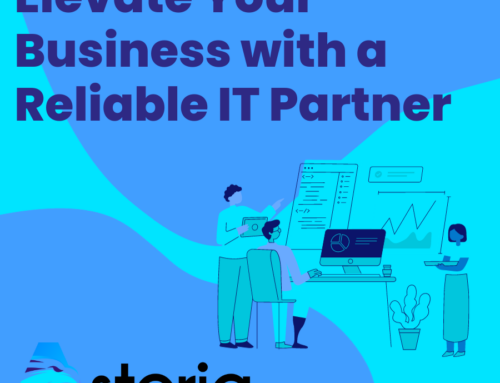“I already have anti-virus software – isn’t that enough?” a client asked us recently. Let’s think about this in the perspective of your home. Is having one lock on your door enough? Would you feel safe with just one lock? If you have three doors that access your home, but only one has a lock, is that enough? Or would you want a lock for each door? What about a deadbolt? Or passcode protection on your garage door? A fire alarm in case of a fire?

Msps help make Cyber easier
This isn’t any different from your cyber security. Having anti-virus software is like having a single lock on your door. Does it help? Absolutely! But is it going to prevent all the different ways you could lose your data? Absolutely not. Securing your cyber security is a multi-step process, much like securing and fully protecting your home.
Every day we see our data and information bought, sold, and moved around. Hackers are becoming increasingly sophisticated in developing new ways to steal what is ours. Our IT security is always at risk. We know how difficult it can be to keep our systems and data safe.
What are the keys to protecting your IT infrastructure? A good anti-virus or a training program may come to mind. It is not about one product or service, but many. Let’s look into eight ways that can help make sure your data is fully secure.
1 – Anti-virus
Anti-virus software works by scanning directories and files for malicious patterns that would allow it to find the presence of malware. It will then remove any malicious software. Depending on the software you use, it may do this in the background, or it may notify you first before removing it. Anti-virus software will also encourage you to schedule scans on a weekly basis to ensure that your computer is staying safe.
Benefits to having sturdy, anti-virus software on your computer:
- Blocking ads. Viruses can enter the computer systems of their victims through pop-up advertisements. A substantial portion of viruses use pop-up ads and websites to make their way into your computer. Oftentimes it is a complete accident. You visit a website; and when you click to move your screen up, an ad pops up at that same moment and you click that instead. Pop-up ads and spam websites are two of the most frequent ways by which viruses can infect your computer.
- Faster computer speed. When you are actively keeping all the junk cleaned out of your computer and folders, you have more room for your computer to work and get you to that deadline faster.
- Protection from shared viruses. If your friend lends you a USB device that was connected to their computer and their computer has a virus, it is very possible that that virus has already corrupted their files and is soon to find its way to yours. However, with anti-virus software, it will scan the device and remove any potentially dangerous viruses.
- Threat Monitoring. Threat monitoring can prevent access to unauthorized websites that could expose your computer system to cyber threats, such as spyware, hackers, and ransomware.
2 – Cloud Backup
The cloud offers you a way to store your data or other items on an internet server, where it can be accessed by other devices that have the login for that data.
For instance, if you have an iPhone, the data that is saved to your iCloud is being stored at data centers that Apple has set up to store Apple users’ cloud data. Your data is downloaded to another computer at an Apple data center, and it is openly available to you via Internet access.
How the cloud helps you:
- Accessibility. Allowing access to your data anytime through multiple devices.
- Recovery. The cloud creates a fast resolution should you have data loss. For instance, if you lose a device through unforeseen circumstances and you have regularly backed up your data before the loss, all your data is just a few keystrokes away from retrieval.
- Flexibility. The cloud creates the perfect infrastructure for businesses to grow and share resources within their business to partners and employees. Along with having a strong backup (should your systems ever suffer a ransomware attack), businesses can feel secure in their data growth and protection.
3 – Two-Factor Authentication
Two Factor Authentication (2fa) is one of the most secure ways to protect yourself from a cyber-attack. As Nate Sheen writes in his book, The Cyber Security Guide: “2fa is so important, as it cuts down on the chances of a brute force attack. This is where a hacker will persistently attack your account with login attempts in the hope of guessing your password. Even if they guess it correctly, they then will need access to your email or cell phone… Even with 2fa, you should have strong unique passwords.”
How 2fa helps you:
- Through text message. This is a quick and uncomplicated way to get started with 2fa, though you should follow other safety steps to ensure further security. SMS 2fa is the most generic form of code sent through SMS. However, it can easily be compromised by hackers – especially if your phone is lost or stolen.
- Biometrics. Facial recognition and fingerprints are two of the most common biometric securities you can implement. Your face is not something that can be duplicated or faked like a password or by answering security questions. This brings a level of security that surpasses most security precautions.
- Physical keys such as USB drives. Having a security USB key that you keep with you at all times on your key ring could be the only thing that keeps a hacker away from your business. Even if a hacker makes it through your 2fa and passwords, without the USB security key they cannot go any further.
4 – Managed Service Provider
A Managed Service Provider (MSP) is a company that provides computing platforms for businesses and organizations to manage their IT infrastructure. MSPs will manage firewalls, servers, and routers on a subscription basis. Depending on your company’s needs, your pricing may vary. Each company will have a unique set-up for their business. Hiring an MSP is becoming more vital for businesses of all shapes and sizes as we live in the ever-evolving world of hackers, ransomware, and data takeovers.
Ways MSPs help you:
- Remote support. Remote support incorporates faster solutions the moment a problem occurs. The remote support team of your MSP is there to answer your questions, troubleshoot and update software, and handle a wide assortment of issues you may come upon.
- 24/7 monitoring. The benefit of an MSP is 24/7 monitoring of your systems. A good MSP is consistently checking and updating software and providing consistent security checks to keep your systems secure. They may also be key to preventing ransomware attacks before they are able to fully infiltrate your systems.
- Maintenance. MSPs help provide vital maintenance to all systems and devices within your facility. This allows you to sit back and relax, knowing your systems are safer. When systems are running at their finest capacities, they are less vulnerable to data losses and malware attacks.
5 – Firewall
Firewalls monitor incoming and outgoing content from your computer network. When connected with an anti-virus, a firewall double checks every file or data that you send from your computer through the internet. This also includes any files or viruses you may receive through files or emails. This can also help protect you from phishing fraud, too.
6 – Contingency Plan
When facing the unthinkable like a data breach or even just your systems crashing, it is important to have a contingency plan in place to keep you on track.
- Cyber Security Plan. Creating a Cyber Security Plan is the best way to protect your interests. How many computers do you have? How many operating systems? How many phones are connected to your system? Do you have a physical security system? Looking into your infrastructure, do you have WiFi? Is that secure? What network devices do you have? Bringing a company in that is gifted in this exact line of work is your best way of ensuring your doors are locked up tightly.
- Breach Plan. What will you do in the event of a breach? You want to figure out what was breached, what was done in the system during the breach, and were any of your customers’ systems were breached as well. Oftentimes hackers will breach one company with the intent to get to another. They may not have been after you, but a customer of yours. Astoria also offers assistance in helping you build a breach plan, helping you ask all the right questions, and cover all your bases.
7 – Physical Security
Physical security is just as important as digital security.
- Cameras. Having cameras on your property can help with quickly identifying someone in a theft if one should occur. If you are able to track when and what was stolen or damaged, you can react faster.
- Alarm System. Alarm systems can become a huge deterrent to burglars. Taking the time to secure your business with a good alarm system can help protect your business and employees.
8 – Insurance
The most important part of your plan is having good insurance. There are many reasons why you should have it. Here are just a few:
- Liability. When you are handling other people’s information and data, you are liable should anything happen while that information is in your care.
- It’s expensive. Even if you don’t pay out money to a hacker, getting your company back to work, and getting your system properly repaired so there isn’t a next time, is expensive.
- Ransom. If, in the unfortunate event all your backups and security measures fail, and you find yourself paying a ransomware hacker, you do not want to be pulling that money from your own bank account.
Now you may be thinking, Wow! That is a lot of steps, and I do not even know where to start. There is good news! A high-level, MSP provider will cover every one of these eight steps that we have reviewed today.
Astoria is a high-level MSP whose goal is to build a plan that helps individuals and businesses to be successful. We look at businesses as a whole and narrow their attention to the details that will ensure the most vulnerable parts of their system are now the strongest.
Striving to create a healthy and strong cyber security plan is a process – one that involves many working parts. Astoria can assist you in creating a strong security plan for you or your business.







